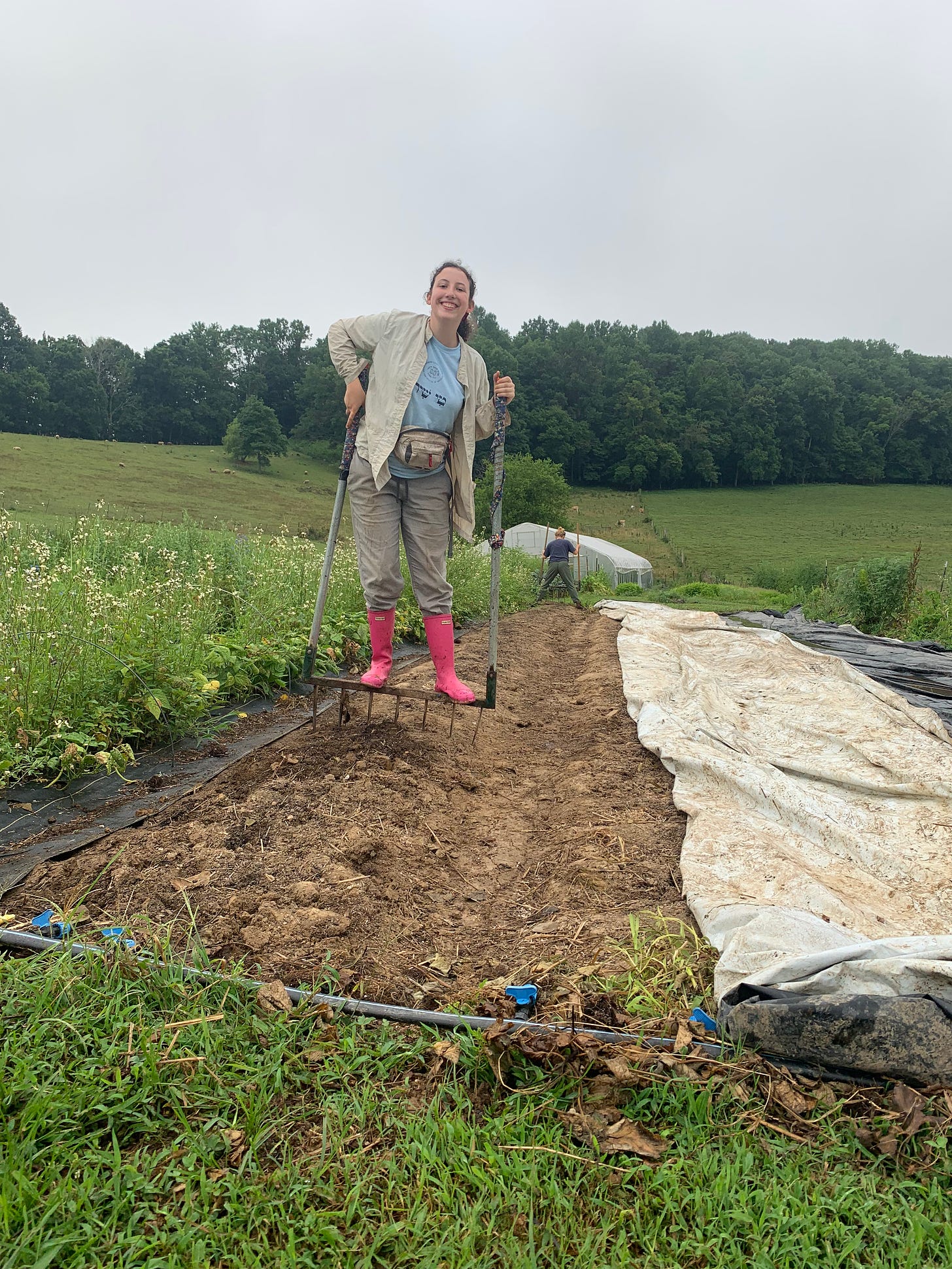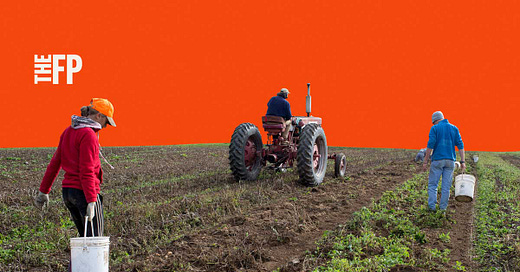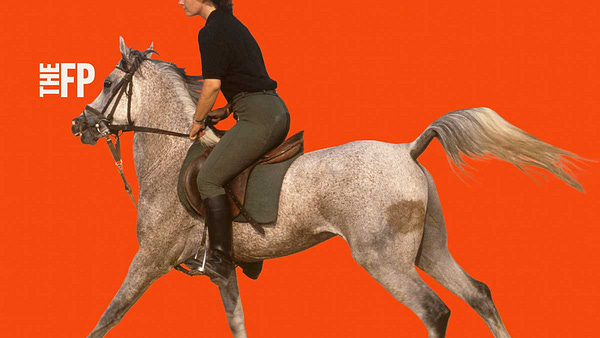
The Free Press

When we, the WWOOFers, went in for lunch at noon, I’d always bring two wheelbarrows full of carrots with me, pushing the carts with my dirt-caked hands. A lot of the carrots were misshapen, covered in soil, or sprouting roots, but I had pulled each one out of the ground myself. After four hours on my knees, I could feel the morning’s work in my body, sore and warm from the beating Tennessee sun.
It was the summer of 2021 and I had been accepted to Stanford University, but before I started college in the fall, I wanted to touch grass. So I’d flown from my native Los Angeles to work manual labor at The Farm & Fiddle in Santa Fe, Tennessee (pronounced, affectionately, as Santa Fee). Among the rolling hills dotted with Confederate flags and dilapidated farmhouses, I was one of a handful of volunteers who’d arrived at the farm via WWOOF—Worldwide Opportunities on Organic Farms.
My first day, I—who had never so much as tended a garden before—woke up at 6 a.m. and learned how to milk a cow (and how to avoid angering her). Then I was handed a bottle of all-natural bug spray and, for the first time, rode in a truck bed. Destination: blueberry patch.
The WWOOFers worked six days a week in exchange for food, housing, and daily lessons in permaculture, an approach to land management that mimics natural ecosystems. The hours were long and often grueling. The frustrations of farmwork were constant: The harvest was sometimes too small to fill the orders from nearby restaurants; the sheep refused to go back inside the barn at night; the tomato plant covered my arms with rashes.
Picking blueberries for eight hours was mundane. Pulling weeds while melting in a long-sleeved top, worn to protect my skin from the sun, was difficult. I gave up physical activity in fourth grade—when I quit the volleyball team after getting hit in the nose one too many times. My varsity letter was for debate, not sports. When I arrived in Tennessee, I was basically a brain in a vat. But there, for the first time in my life, I felt fully connected to my body.
WWOOF began in 1971 because the founder, Englishwoman Sue Coppard, wanted to give urbanites a way to connect to the natural world. A secretary in London, Coppard understood city dwellers’ “deep urge to get into the countryside.” And so she set up Working Weekends on Organic Farms. (The organization changed its name as it grew.)
“It grew organically around the world,” said Sarah Potenza, who set up the U.S. chapter of WWOOF in 2001. “Somebody would go WWOOFing in, for example, the UK, and then go home to, say, New Zealand,” and set up a branch there.
Potenza herself was inspired to introduce the organization to the U.S. after spending six months as a WWOOFer in New Zealand as a young college graduate. (She studied agroecology and environmental science at UC Santa Cruz, graduating in 1999.) She estimates that “hundreds of thousands” of people have WWOOFed in the U.S. since then. Currently, 1,300 American farms host WWOOFers, and 13,000 people have WWOOF USA membership—which costs $40 per year, or $65 a year for couples, and allows people to find farms across the country where they can work.
Most WWOOFers are young and, Potenza said, “a lot of farmers use WWOOF because they see the value in passing on what they know about farming to another generation.” They’re also getting laborers, of course, even if some of those laborers are clueless.
Americans are becoming increasingly out of touch with the land. A century ago, 30 percent of the population were farmers; now, they make up 1.2 percent of the American workforce. Since the Industrial Revolution, ambitious young workers have flocked to the big cities.
And the desire Coppard tapped into in 1971 has become only more prevalent: We want a break from city life. “People are getting really burnt out,” said Christine Orzechowski, 28, a Seattle-based digital designer who took a three-week sabbatical to WWOOF on Whidbey Island, Washington, in June 2023.
“A lot of people are fantasizing,” she said, “about that lifestyle of being on the land or on a farm”—particularly millennials and Gen Z.
If you spend any time on Instagram, you’ll know what she means. In the last few years, “cottagecore,” an aesthetic that romanticizes rural life, has boomed—partly thanks to influencers like Hannah Neeleman, who runs the account Ballerina Farm, where she posts about life with her husband and eight kids in rural Utah. There are a lot of pictures of cows. She has 10 million followers on Instagram. Even the farm I worked on, The Farm & Fiddle, has upward of 12,000 followers.
Orzechowski is not sure if young people are fantasizing about a farming lifestyle because of “escapism” or if “people actually want to do it”—but she can see why it “just seems more appealing. . . than what we are currently living in.” (Do I need to remind you that young people are increasingly depressed, detached, and technology-addled?)
When I spoke to her, Orzechowski reminisced about her time on Whidbey, distilling lavender oil, picking herbs, and foraging for mushrooms. She described seeing “how these products were made, how those mushrooms were grown from seed to full lion’s mane” as a “very, very cool process.”
But the biggest lesson she took away from WWOOFing, she told me, was “that there is another way to live.”
“It’s not just the nine-to-five living in a city grind.”
Growing up in Seattle, she enjoyed tending her garden, but had never thought about pursuing agriculture as a career; her experience WWOOFing “kind of made me think twice about life decisions. I was like, oh, maybe I want to do this in the future.”
For now, she’s still in the city. When I asked her why, she said that farming “takes a lot of time and money and effort.”

Like Orzechowski, most WWOOFers return to the comforts of laptop work or academia after trying their hand at farming, myself very much included. But there are exceptions.
“Once I started doing it, I never wanted to stop,” said Eden Bailie, 22, one of my fellow volunteers at The Farm & Fiddle. She grew up in rural Bucks County in Pennsylvania, but at her high school, “there was no gym, there were no outdoor activities.” Like me, she graduated on Zoom (in 2020, obviously).
“I felt pretty disconnected from my body,” she said.
So rather than starting college online, Eden chose to WWOOF, from April to August in 2021.
“I had never worked so hard, physically,” she told me.
When I asked Eden what she most remembered, she recalled “getting to watch things get done in an old-fashioned way.” The farm we worked at was no-till, meaning we didn’t use machinery to harvest or plant crops. “We were only using hand tools,” Eden said, “and it made me feel very powerful, made me feel like I have control over my life.”
After she left Tennessee, Eden worked at a much larger farm in New Jersey for two summers, the second in a managerial position. This time, she was employed, not WWOOFing.
“It was so different,” she said. “It was industrial and targeted toward production, which I loved, because we fed so many people.”
Her view of farming is now a lot more practical than a lot of former WWOOfers. But even Eden admits that she “definitely romanticized” it, “before I started doing it.” In her early days as a WWOOFer, she said, she was “probably pretty pretentious about it.”
“I was 18 when I started farming, but it felt like I was doing something groundbreaking and really different, and I loved to brag about it.”
But eventually, “It just becomes work.”
“I realized, oh, this is normal,” Eden told me, “This has been normal for thousands of years. . . . Growing your own food and living with your extended family: That’s normal, and everything else isn’t.”
These days, Eden works with her boyfriend, Owen, on his family farm in Berks County, Pennsylvania. She has no plans to give up farming.
How does Eden feel about the fact that her job is, for other people, an experience, romanticized on social media and packaged as a product by WWOOF?
“I’m okay with it,” said Eden, “if it means more people are interested in it.”
But WWOOFers are farmworkers by choice, rather than necessity, doing for free—and for fun—what thousands of people do for a living. One of my fellow volunteers often remarked that some of his close friends scoffed at him for WWOOFing: They were the children of immigrants who had come to the United States and ended up working low-wage farm jobs. They didn’t understand why we’d do the same thing in pursuit of self-actualization.
Everyone who WWOOFs is likely to confront this uncomfortable truth, although it’s worth pointing out that America is currently struggling with a severe labor shortage in the agricultural sector: WWOOFers aren’t robbing anyone of the opportunity to do paid farmwork.
Lauren, a former WWOOFer with an environmental studies degree from NYU, told me that the important thing is “standing in solidarity with those people who are growing some of the food that you’re eating.”
How does she do this?
“I waste a lot less food, or I really try to buy locally or seasonally,” she told me. “I just understand what goes into growing your own food.”
I asked Potenza about the fact that most of the WWOOF USA volunteers are white, upper-class young adults like me. She said, “I recognize that it can be difficult for some people to find the time to be away from a job or other commitments.”
I was lucky to be able to WWOOF; the summer before my freshman year at college, I had nothing but time. And I’m so glad that, after growing up in an urban jungle, I used it to get to know part of America I’d never visited, and to befriend Americans like Eden, who’ll lead a very different life than me.
Yes, I romanticized farmwork, and then I got my hands dirty, and realized how hard it is. But just as importantly, I realized it can feel good. For one summer, I was more than a mind in a vat—even if that’s what I’ve chosen to become. If you’re going to spend your life on a laptop, it’s worth finding out what work has looked like for as long as there have been humans on this earth.
Julia Steinberg is an intern at The Free Press. Read her piece on the college dropout who unlocked the secrets of ancient Rome using AI.
To support more of our work, become a Free Press subscriber today:










I worked on a farm every summer. Decided it was too hard for me and went to medical school instead. Still have good memories of working on the farm. I had to dump 2 tons of rotten onions on a field once, shovel manure into the spreader and many fun jobs like those. One thing you learn is when you hoe a long row it will be finished eventually. Just like going to med school.
Former Title I public HS teacher here. This piece reads like a self-congratulatory college application essay. "My Volunteer Experience Performing Unskilled Manual Labor." The author ignores the unfortunate reality that most U.S. high school students need to learn how to "work hard" academically, not physically. This means learning how to focus for sustained time periods on complex tasks, learning how to read and write with fluency and accuracy, etc. And if the author feels that it's important to "stand in solidarity" with workers who perform unskilled manual labor, one would assume that she also supports expanding wealth taxes and labor unions.